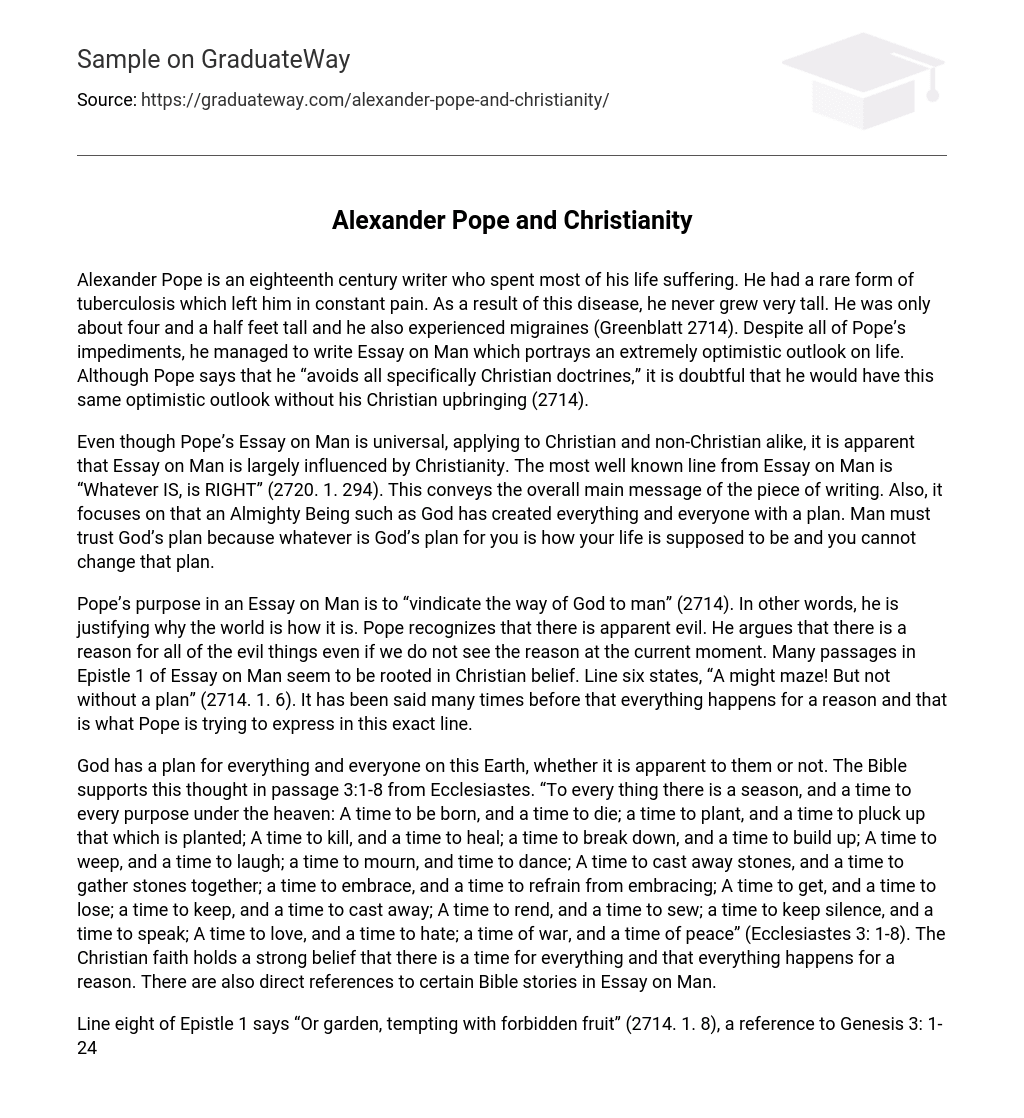Alexander Pope, an eighteenth-century writer, endured a life of suffering due to a rare form of tuberculosis that caused chronic pain. This illness also stunted his growth, leaving him at a height of approximately four and a half feet. Additionally, Pope frequently experienced migraines (Greenblatt 2714). Despite these obstacles, Pope was able to compose Essay on Man, a work that conveys an overwhelmingly positive perspective on life. While Pope claims to “avoid all specifically Christian doctrines,” it is unlikely he would possess such optimism without his Christian upbringing (2714).
Despite being applicable to both Christians and non-Christians, Pope’s Essay on Man is heavily influenced by Christianity. The famous line “Whatever IS, is RIGHT” (2720. 1. 294) encapsulates the main message of the essay, emphasizing the belief that an Almighty Being, like God, is responsible for creating everything and everyone with a specific purpose. It asserts the importance of trusting in God’s plan, as one’s life is meant to unfold according to that divine plan, which cannot be altered.
The main objective of Pope’s Essay on Man is to provide a rationale for the way God deals with humanity (2714). In simpler terms, his aim is to elucidate the reasons behind the current state of the world, taking into account the existence of apparent evil. According to Pope, even though we may not comprehend it presently, there exists a purpose behind all malevolent occurrences. Numerous passages in Epistle 1 of Essay on Man appear to draw from Christian beliefs. Line six declares, “A might maze! But not without a plan” (2714. 1. 6). This line echoes the prevailing belief that everything happens with a specific intention, which Pope is conveying.
The Bible, specifically passage 3:1-8 from Ecclesiastes, affirms that God has a plan for all things and everyone on Earth, even if it may not be clear to them. The passage emphasizes the importance of timing and purpose in various aspects of life, including birth and death, planting and harvesting, killing and healing, breaking down and building up, weeping and laughing, mourning and dancing, casting away stones and gathering stones together, embracing and refraining from embracing, gaining and losing, keeping and casting away, rending and sewing, keeping silence and speaking , lovingand hating ,and experiencing warand peace. These verses uphold the Christian belief in divine providence. Furthermore,the Essay on Man makes references to specific biblical stories.
In Epistle 1 of Essay on Man, Pope alludes to the Fall of Man in Genesis and emphasizes that temptation has been present since the beginning of time. He argues that this biblical passage proves the existence of temptation. Another theme in the essay is the imperfect nature of man. Pope asserts that no man is perfect and quotes from 2 Chronicles and Romans to support this claim. In Section 4 of Epistle 1, Pope discusses how man’s ignorance of the future gives him hope.
The excerpt from line 85 expresses the idea of being blind to the future, which allows us to have faith in God. While we may be uncertain about what lies ahead, God is not. Because He knows our future, we trust that if we live righteously, everything will align with our desires. Jeremiah 29:11 confirms God’s thoughts for us are good and will lead to an expected end. We trust and believe in Him, so we trust and believe in our futures. Both Essay on Man and The Bible depict pride as a sin that brings misery to humans. Pope writes in Essay on Man that our error lies in prideful reasoning. Humans possess the flaw of pride as they constantly seek knowledge and perfection, leading ultimately to despair. Proverbs 21:4 states that a proud heart is sinful.
The idea that pride is a negative and sinful trait is supported both in Romans 12:16, which says “Be of the same mind one toward another. Mind not high things, but condescend to men of low estate. Be not wise in your own conceits.” These verses align with Pope’s thoughts. Finally, in the conclusion of “Essay on Man”, Pope reiterates the belief that everything occurs by design, stating “One truth is clear, Whatever IS, is RIGHT” (2720). This concluding statement effectively conveys Pope’s sentiment.
Irrespective of the circumstances or challenges faced, the individual firmly believes that it is the correct course of action. This perspective closely aligns with Christian doctrine. The Bible verse 1 Thessalonians 5:18 states, “In everything give thanks: for this is the will of God in Christ Jesus concerning you” (1 Thessalonians 5:18). Christians believe that whatever occurs in their lives is part of God’s plan and serves a purpose. Even if this purpose is not immediately apparent, Christians have faith in its existence. As believers in an unseen God, Christians also put their trust in these imperceptible and unfathomable reasons.
Pope asserts that he wrote the Essay on Man for universal appeal. Although it resonates with diverse individuals, many of his core principles are clearly mirrored in numerous Bible verses. Pope primarily addresses concepts such as the existence of purpose in all occurrences, the imperfection of humanity, and the incomprehensibility of the future. The Bible extensively explores these themes. Ultimately, it is apparent that Pope’s Christian upbringing significantly shaped his beliefs expressed in the Essay on Man, notwithstanding his contrary assertions.





